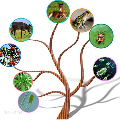Large Language Models (LLMs) and Multi-Agent LLMs (MALLMs) introduce non-determinism unlike traditional or machine learning software, requiring new approaches to verifying correctness beyond simple output comparisons or statistical accuracy over test datasets. This paper presents a taxonomy for LLM test case design, informed by research literature and our experience. Each facet is exemplified, and we conduct an LLM-assisted analysis of six open-source testing frameworks, perform a sensitivity study of an agent-based system across different model configurations, and provide working examples contrasting atomic and aggregated test cases. We identify key variation points that impact test correctness and highlight open challenges that the research, industry, and open-source communities must address as LLMs become integral to software systems. Our taxonomy defines four facets of LLM test case design, addressing ambiguity in both inputs and outputs while establishing best practices. It distinguishes variability in goals, the system under test, and inputs, and introduces two key oracle types: atomic and aggregated. Our findings reveal that current tools treat test executions as isolated events, lack explicit aggregation mechanisms, and inadequately capture variability across model versions, configurations, and repeated runs. This highlights the need for viewing correctness as a distribution of outcomes rather than a binary property, requiring closer collaboration between academia and practitioners to establish mature, variability-aware testing methodologies.
翻译:暂无翻译




